'Vaginal mesh surgery ruined my life and should be banned'
- Published

Wales should ban the use of vaginal mesh implants, a campaigner has said.
Hundreds of women across the UK say the procedure - used to treat incontinence and prolapse after childbirth - has left them physically and mentally scarred.
A report by the NHS England-led Mesh Working Group, external, published last week, said the use of mesh was still "a safe option".
The Welsh Government said it was going to set up a working group to "consider the latest recommendations and determine what further action we may need to take".
Karen Preater, a member of the Welsh Mesh Survivors group, said the surgery ruined her life. Here, she tells her story.

I'm 40, yet I feel 100.
Before I had this operation, I had a good job in sales. I was a happy, active mum and I had a great relationship with my partner of 12 years.
Now I'm in constant pain, I walk with a stick, I lost my job and the intimate side of my relationship is ruined.
My life has changed beyond recognition and I struggle with depression. If it wasn't for my family, I probably wouldn't be talking to you now.
It started in 2014, when I had a tension-free vaginal tape (TVT) inserted to treat urinary incontinence.
I'd suffered with it for seven years, after my son was born weighing 10lb 1oz.
Eventually I was referred to a gynaecology department and they did a few tests and said the best thing they could advise was to have a sling (also called a mesh or tape) inserted.
I'd never heard of it before but they said 'oh it's just a little sling to pull you up and help with the incontinence'.
It sounded fantastic - the nurse said I'd only be in hospital a day but I ended up staying in for eight.
As soon as I came round from the anaesthetic, I was in excruciating pain with my left hip and thigh.
I couldn't pass any water so had to use catheters.
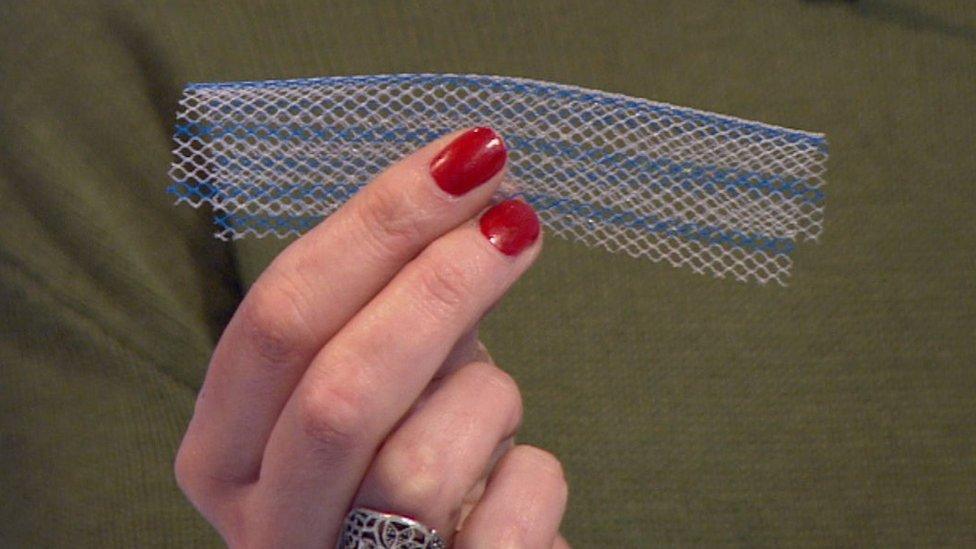
The mesh implants are used to ease incontinence and to support organs
Hospital staff said that was normal because I'd just had an operation on my bladder but there was no real explanation given for the pain. I was given painkillers and kept in hospital.
I eventually hobbled out on crutches, still in pain, and still not being able to empty my bladder fully.
Three-and-a-half years later, I still have to self-catheterise five to six times a day.
And the pain is constant. It's in my hip, thigh and my groin.
There are things that aggravate it, like too much walking, or if I drive too far. But it never goes away - day in, day out, through the night, it just never lets up.
I don't use crutches any more but I do use a walking stick to take the pressure off my leg.
I get random shooting pains and sometimes my leg just goes out from under me. A few times I have ended up at the bottom of the stairs, so my partner had to put in a banister on both sides to stop me falling.
I'd always worked full-time, I had a really good job in field sales but it involved a lot of driving and I had to give it up.
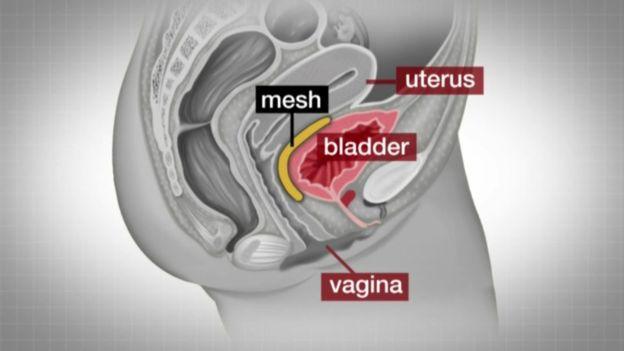
The mesh is made of a polypropolene, a type of plastic
When you're used to seeing people every day, sitting at home alone when the kids are in school, you do start to go a bit stir crazy and there are days when I just think, 'just shut the door, keep everything out'.
It's massively affected my relationship with my partner and it's really tough on the kids. I used to do lots of things with them - going out for a walk or swimming - but now it's got to the point where they've just given up asking.
They won't say "can we go for a day out?" because a day out for me is usually not a day - it's a couple of hours with a lot of rests and it also means I then have to spend extra time recuperating.
I couldn't run in the parents' race at my son's sports day, even though I always did it for the older two. It's little things like that which might not seem a lot to somebody but it's a lot to me.
After I had my son, I did get a bit of post-natal depression, which turned into full depression. I was medicated slightly but these last three years my meds have been doubled.
I just have to get by reasoning that I am going to have really low days and I just need to get through that day, that's all that matters, just getting through one day and then starting the next one.

Ms Preater and other anti-mesh campaigners took their fight to Westminster in July
I've spent the last three-and-a-half years trying to find out what's wrong with me.
I've probably seen five or six different consultants in different departments, and they've all said "I'm really flummoxed as to what's the matter, it's not my speciality, I'll have to send you to a different doctor".
It wasn't until I saw Kath Sansom, the founder of the Sling the Mesh, external campaign, on the news that I thought 'well, maybe this is what's the matter'. I'm now waiting to see a gynaecologist.
There are specialists that can remove mesh but it's not an easy operation because the damage that's done is in the nerves.
I know of women that have had six or seven surgeries because it has to be taken out bit by tiny bit and at this point in time, I don't think I could mentally cope with that in-depth surgery and worrying that the pain could actually get worse.
There needs to be a suspension of this procedure in Wales and Wales needs to have its own inquiry into the complications.
So many women still don't have a clue and unless it's thoroughly looked into, we will still be in the same position in a few years' time.
- Published3 August 2017
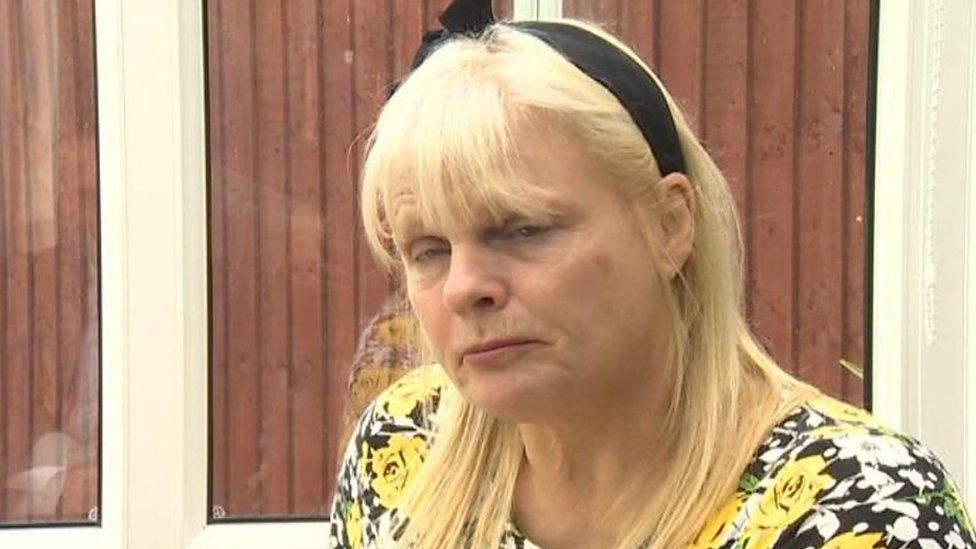
- Published18 July 2017
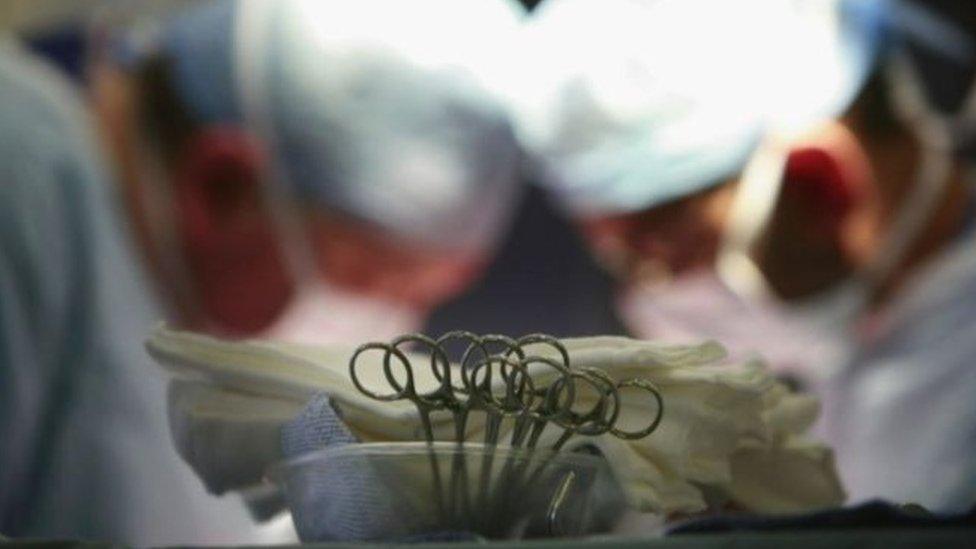
- Published26 June 2017
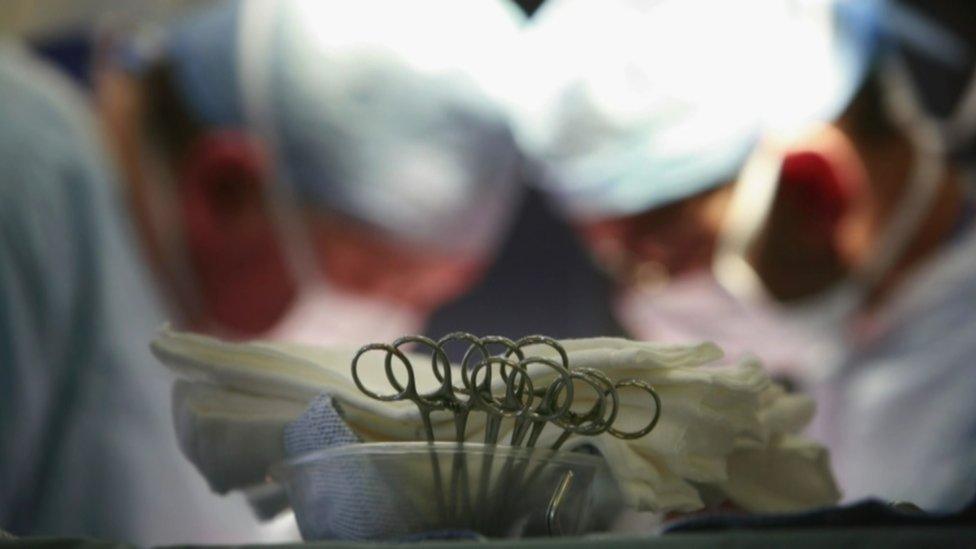
- Published18 April 2017

- Published21 December 2016
